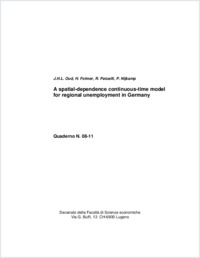A spatial-dependence continuous-time model for regional unemployment in Germany
- Oud, Johan H.L. Radboud University Nijmegen, The Netherlands
- Folmer, Henk University of Groningen, The Netherlands
- Patuelli, Roberto Istituto di ricerche economiche (IRE), Facoltà di scienze economiche, Università della Svizzera italiana, Svizzera
- Nijkamp, Peter VU University Amsterdam, The Netherlands
-
2008
19 p
Continuous time modelling
Structural equation modelling
Spatial dependence
Panel data
Disattenuation
Measurement errors
Germany
English
This paper analyzes patterns of regional labour market development in Germany over the period 2000-2003 by means of a spatial-dependence continuous-time model. (Spatial) panel data are routinely modelled in discrete time. However, there are compelling arguments for continuous time modelling of (spatial) panel data. Particularly, most social processes evolve in continuous time such that analysis in discrete time is an oversimplification, gives a distorted representation of reality and leads to misinterpretation of estimation results. The most compelling reason for continuous time modelling is that, in contrast to discrete time modelling, it allows for adequate modelling of dynamic adjustment processes (see, for example, Special Issue 62:1, 2008, of Statistica Neerlandica). We introduce spatial dependence in a continuous time modelling framework and apply the unified framework to regional labour market development in Germany. The empirical results show substantial autoregressive effects for unemployment and population development, as well as a negative effect of unemployment development on population development. The reverse effect is not significant. Neither are the effects of the development of regional average wages and of the manufacturing sector on the development of unemployment and population.
- Language
-
- English
- Classification
- Economics
- License
-
License undefined
- Open access status
- green
- Identifiers
-
- RERO DOC 11220
- ARK ark:/12658/srd1318079
- Persistent URL
- https://n2t.net/ark:/12658/srd1318079
Statistics
Document views: 181
File downloads:
- Texte intégral: 251
